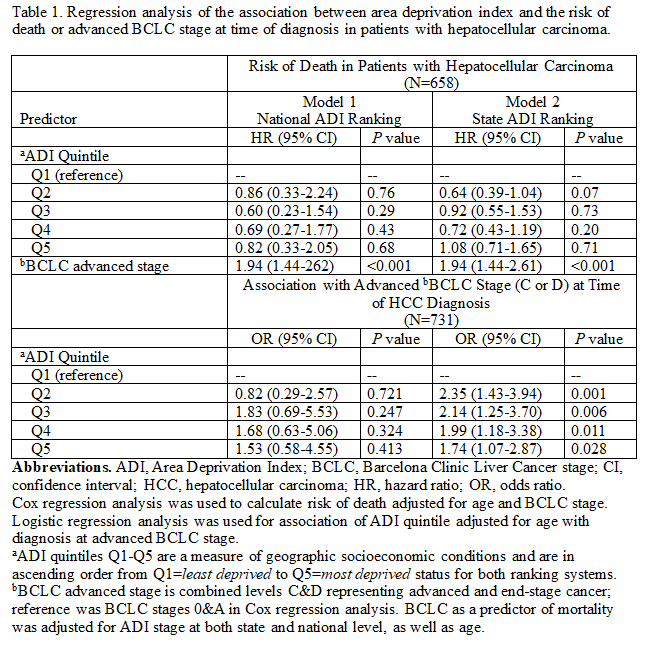Monday Poster Session
Category: Liver
P3725 - The Limited Role of Socioeconomic Deprivation in Hepatocellular Carcinoma Outcomes: A Retrospective Analysis
Monday, October 27, 2025
10:30 AM - 4:00 PM PDT
Location: Exhibit Hall

Avi Toiv, MD
Henry Ford Hospital
Detroit, MI
Presenting Author(s)
Avi Toiv, MD1, Hope O'Brien, BS2, Tyler Andrews, DO1, Anqi Wang, PhD1, Laila Poisson, PhD1, Reena Salgia, MD3
1Henry Ford Hospital, Detroit, MI; 2Wayne State University School of Medicine, Detroit, MI; 3Henry Ford Health, Detroit, MI
Introduction: Hepatocellular carcinoma (HCC) is a leading cause of cancer-related death worldwide, yet mortality outcomes in patients with HCC can vary widely. Socioeconomic disparities are known to influence health outcomes in patients with various cancers. This study investigates whether socioeconomic status as measured by the Area Deprivation Index (ADI) is associated with mortality and Barcelona Clinic Liver Cancer (BCLC) stage at time of diagnosis in patients with HCC.
Methods: A retrospective chart review of all patients treated for HCC at an academic liver center between January 1, 2016, and December 31, 2020. The primary outcome was time to cause-specific death. The secondary outcome was BCLC stage at time of HCC diagnosis. Cox regression models adjusted for age, BCLC stage, and either national or state ADI quintiles were performed to assess the association of socioeconomic status with survival and cancer stage at diagnosis in patients with HCC.
Results: A total of 980 patients (median age 66 years; interquartile range 61-72) were included. ADI was not a significant predictor of mortality across all quintiles (Table). Severity of HCC at diagnosis was associated with increasing deprivation at the state level ADI (P< 0.5 at all quintiles) but not the national ADI level. Advanced BCLC stage (C and D) was significantly associated with cause-specific death in patients with HCC in both models (hazard ratio, 1.94, 95% CI, 1.44-2.62; P < 0.001; hazard ratio, 1.94; 95% CI, 1.44-2.61; P < 0.001).
Discussion: This study highlights the crucial role of early detection at lower clinical stages for improving survival outcomes in patients with HCC. Unlike other cancer types in which socioeconomic disparities significantly influence survival, HCC appears unique since ADI was associated with severity of cancer at HCC diagnosis; however, mortality risk remained consistent across all ADI quintiles. Targeted interventions aimed at addressing socioeconomic disparities may not significantly affect mortality in patients with HCC as with other cancers.

Figure: Table 1
Disclosures:
Avi Toiv indicated no relevant financial relationships.
Hope O'Brien indicated no relevant financial relationships.
Tyler Andrews indicated no relevant financial relationships.
Anqi Wang indicated no relevant financial relationships.
Laila Poisson indicated no relevant financial relationships.
Reena Salgia indicated no relevant financial relationships.
Avi Toiv, MD1, Hope O'Brien, BS2, Tyler Andrews, DO1, Anqi Wang, PhD1, Laila Poisson, PhD1, Reena Salgia, MD3. P3725 - The Limited Role of Socioeconomic Deprivation in Hepatocellular Carcinoma Outcomes: A Retrospective Analysis, ACG 2025 Annual Scientific Meeting Abstracts. Phoenix, AZ: American College of Gastroenterology.
1Henry Ford Hospital, Detroit, MI; 2Wayne State University School of Medicine, Detroit, MI; 3Henry Ford Health, Detroit, MI
Introduction: Hepatocellular carcinoma (HCC) is a leading cause of cancer-related death worldwide, yet mortality outcomes in patients with HCC can vary widely. Socioeconomic disparities are known to influence health outcomes in patients with various cancers. This study investigates whether socioeconomic status as measured by the Area Deprivation Index (ADI) is associated with mortality and Barcelona Clinic Liver Cancer (BCLC) stage at time of diagnosis in patients with HCC.
Methods: A retrospective chart review of all patients treated for HCC at an academic liver center between January 1, 2016, and December 31, 2020. The primary outcome was time to cause-specific death. The secondary outcome was BCLC stage at time of HCC diagnosis. Cox regression models adjusted for age, BCLC stage, and either national or state ADI quintiles were performed to assess the association of socioeconomic status with survival and cancer stage at diagnosis in patients with HCC.
Results: A total of 980 patients (median age 66 years; interquartile range 61-72) were included. ADI was not a significant predictor of mortality across all quintiles (Table). Severity of HCC at diagnosis was associated with increasing deprivation at the state level ADI (P< 0.5 at all quintiles) but not the national ADI level. Advanced BCLC stage (C and D) was significantly associated with cause-specific death in patients with HCC in both models (hazard ratio, 1.94, 95% CI, 1.44-2.62; P < 0.001; hazard ratio, 1.94; 95% CI, 1.44-2.61; P < 0.001).
Discussion: This study highlights the crucial role of early detection at lower clinical stages for improving survival outcomes in patients with HCC. Unlike other cancer types in which socioeconomic disparities significantly influence survival, HCC appears unique since ADI was associated with severity of cancer at HCC diagnosis; however, mortality risk remained consistent across all ADI quintiles. Targeted interventions aimed at addressing socioeconomic disparities may not significantly affect mortality in patients with HCC as with other cancers.

Figure: Table 1
Disclosures:
Avi Toiv indicated no relevant financial relationships.
Hope O'Brien indicated no relevant financial relationships.
Tyler Andrews indicated no relevant financial relationships.
Anqi Wang indicated no relevant financial relationships.
Laila Poisson indicated no relevant financial relationships.
Reena Salgia indicated no relevant financial relationships.
Avi Toiv, MD1, Hope O'Brien, BS2, Tyler Andrews, DO1, Anqi Wang, PhD1, Laila Poisson, PhD1, Reena Salgia, MD3. P3725 - The Limited Role of Socioeconomic Deprivation in Hepatocellular Carcinoma Outcomes: A Retrospective Analysis, ACG 2025 Annual Scientific Meeting Abstracts. Phoenix, AZ: American College of Gastroenterology.
